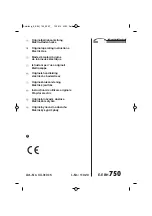
2
cramer.eu
EN
Product Overview
Your machine has been engineered and manufactured to high standard for
dependability, ease of operation, and operator safety. When properly cared for, it
will give you years of trouble-free performance.
Know your Cultivator
1. Tine
2. Gear box
3. Guard
4. Rubber protector
5. Lower shaft
6. Release button
7. Knob
Assembly
•
This product requires assembly.
•
Carefully remove the product and any accessories from the box. Make sure
that all items listed in the packing list are included.
•
Inspect the product carefully to make sure no breakage or damage
occurred during shipping.
•
Do not discard the packing material until you have carefully inspected and
satisfactorily operated the product.
Install the Attachment
(See Figure 2)
1
Remove the rubber protector.
2
Loosen the knob on the coupler.
3
Push in the release button located on the lower shaft. Align the release
button with the positioning hole and slide the two shafts together. Rotate the
lower shaft until the button locks into the positioning hole.
4
Tighten the knob securely.
NOTE: If the button does not release completely in the positioning hole, the
shafts are not locked into place. Slightly rotate from side to side until the button is
locked into place.
Operation
Applications
•
Breaking up garden soil to prepare seed bed for planting.
•
Shallow cultivating to remove weeds.
Preparing The Seed Bed
The cultivator can be used to break up garden soil and prepare a seedbed for
planting. Plan ahead to leave enough room between the seed rows to allow for
machine cultivating after the plants have grown.
Several passes over the same path may be required to reach the desired depth. Do
not try to dig too deeply in the first pass.
•
If the machine jumps or bucks, allow the unit to move forward at a slightly
faster rate.
•
If the machine stays and digs in one spot, try rocking the unit from side to
side to start it moving forward again. If the soil is very hard, water a few days
before cultivating. Avoid working the soil when soggy or wet. Wait a day or
two after heavy rain for the ground to dry.
Maintenance
Clean the Machine
Clean the machine thoroughly to remove all dust and debris, after every work session.
•
To reduce fire hazards, keep the machine and, in particular, the motor free
of leaves, branches or excessive grease.
•
Always clean the machine after use with a damp cloth dipped in neutral
detergent.
•
Remove all traces of humidity using a soft damp cloth. Humidity can
generate risks of electric shocks.
•
Do not use aggressive detergents or solvents to clean the plastic parts or
handgrips.
•
Do not spray water onto the motor and electrical components and prevent
them from getting wet.
•
To avoid overheating and damage to the motor or the battery, always keep
the cooling air vents clean and free of debris.



































